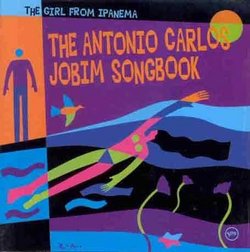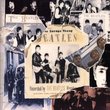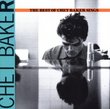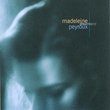| All Artists: Antonio Carlos Jobim Title: The Girl From Ipanema: The Antonio Carlos Jobim Songbook Members Wishing: 0 Total Copies: 2 Label: Polygram Records Original Release Date: 5/23/1995 Release Date: 5/23/1995 Genres: International Music, Jazz, Pop, Broadway & Vocalists, Latin Music Styles: Caribbean & Cuba, Cuba, South & Central America, Brazil, Latin Music, Samba, Brazilian Jazz, Latin Jazz, Modern Postbebop, Smooth Jazz, Swing Jazz, Vocal Jazz, Bebop, Oldies, Traditional Vocal Pop, Latin Pop Number of Discs: 1 SwapaCD Credits: 1 UPC: 731452547224 |
Search - Antonio Carlos Jobim :: The Girl From Ipanema: The Antonio Carlos Jobim Songbook
 | Antonio Carlos Jobim The Girl From Ipanema: The Antonio Carlos Jobim Songbook Genres: International Music, Jazz, Pop, Broadway & Vocalists, Latin Music
This 1995 tribute to the late Brazilian bossa nova master draws from the cream of the Verve/Polygram jazz catalog. Saxophonist Stan Getz, who introduced the sublimely sensual bossa nova to North American audiences in the e... more » ![header=[] body=[This CD is available to be requested as disc only.]](/images/attributes/disc.png?v=15401716) ![header=[] body=[This CD is available to be requested with the disc and back insert.]](/images/attributes/disc_back.png?v=15401716) ![header=[] body=[This CD is available to be requested with the disc and front insert.]](/images/attributes/disc_front.png?v=15401716) ![header=[] body=[This CD is available to be requested with the disc, front and back inserts.]](/images/attributes/disc_front_back.png?v=15401716) |
Larger Image |
CD DetailsSynopsis
Amazon.com This 1995 tribute to the late Brazilian bossa nova master draws from the cream of the Verve/Polygram jazz catalog. Saxophonist Stan Getz, who introduced the sublimely sensual bossa nova to North American audiences in the early '60s, is joined by vocalist João Gilberto on the well-known title track and by guitarist Luiz Bonfa on the exquisite "O Morro Nao Tem Vez." Sarah Vaughan ("Corcovado"), Billy Eckstine ("Felicidade"), Wes Montgomery ("How Insensitive"), and Oscar Peterson ("Wave") also turn in classic performances from the '60s. Jobim himself offers guitar and piano accompaniment on several tracks and duets with Brazilian vocalist Elis Regina on "Aguas de Marco." Although subsequent generations of lame lounge singers have robbed bossa nova of its original mystique, in its pure form, this music is unsurpassed in conveying an intimately romantic mood with carefree sophistication. --Rick Mitchell Similarly Requested CDs
|
CD ReviewsThe best Jobim CD! A must-have! loungelizard7 | 11/26/1999 (5 out of 5 stars) "This is one great CD. Not only are the songs wonderful, but the liner notes are nice, the simplistic and colorful cover art is lovely, and the CD itself has an interesting look. For listeners like me, who love Jobim's music but prefer the more popular ones, and usually like covers more often than the originals, this is for you.It starts off with the title track, that ever-popular standard, "The Girl from Ipanema." It is sung first in Portugese (so intriguing) and then the easy, effortless voice of Astrud Gilberto breezes in with the English lyrics. Before the song is over, you'll hear a nice piano version of the tune, preceded by legendary tenor sax player Stan Getz's beautiful. (I love the part where he starts and stops repeatedly.) It's easy to see why this recording became a classic. Second is one of the disc's best, jazz diva Sarah Vaughan's glossy version of "Corcovado," or "Quiet Nights of Quiet Stars," as the English one goes. This is the without a doubt the most beautiful recording I've ever heard. The arrangement could not be better, and the same goes for Vaughan's voice. The whole thing comes off with a very relaxed, daydream feel to it. Listen closely to the lyrics; they put such vivid pictures in one's mind, yet are such simple words. It's so very romantic, and is the best song on the CD to put on if you just want to lay back and forget your troubles along with the whole world. If you just let yourself melt into the music, let it envelop you, it really does make all frustrations slip away from you. Jobim's music, when done properly, can do that. Some will go wither way on Billy Eckstine's "Felicidade," but I like it. Once the opening (with the shouting and the Eckstine's voice echoing) is over, a steady and infectious guitar rhythm takes over, and the listener is treated to Eckstine's rich, deep voice as it swoops through the notes. Next up is a song that has an effect much like that of the very relaxing Track 2, an intimate and very sexy arrangement of "Favela" (which I believe is, interestingly, the Portugese word for a small hovel). (There is, by the way, a little-Known English version called "Somewhere in the Hills." It can be found on the Ella Fitzgerald CD 'Ella Abraca Jobim.' Fitzgerald also appears on this CD.) Sounding much more like a late-night mood-enhancer than usual, the risk definitely pays off, creating a track that slowly and rather quietly sizzles from start to finish. The beat (and rhythm from Jobim's guitar) pulls you in, and you never want to let the song go. Jobim turns in a lovely solo, and always-great bassist Joe Mondragon, although he has a very good solo, is owed much credit for the quality of the song and subtly makes his presence known through the entire track. But nontheless, it's Getz and his steamy sax that dominates here. Laid-back and cool, his playing is so relaxed and effortless (much like Gilberto's voice) that it seems to become one with the rhythm. It doesn't even sound like he's trying at all, just swimming along with the melody. But that doesn't mean that he sounds lazy; each note is more intriguing than the last. After the solos in the middle of the song, at about 4:20, the beat picks up and Getz roars back in full-force, sometimes crooning, sometimes wailing, sometimes growling, but never jarring the mood or throwing the feeling, sailing jazzily toward the end. This part, between the bass solo and the reprise of the melody, is musical gold. After this incredible improvisation segment, he slips flawlessly back into the tune at a hushed, almost whispered tone, easing the listener into an even deeper calm before the song unfortunately fades out... Track 5 abruptly begins with the voices of Gilberto and Jobim and a light but catchy bossa beat that works its way into your blood and makes you want to run out to Arthur Murray and get lessons. Gilberto sings the soft melody and then begins the chorus: "Agua de beber, agua de beber camara..." before she and Jobim launch into the jazzy second chorus. I love this song, too, and All Jarreau does a dynamic version on it "Best of..." CD (also worth buying!). "So Danco Samba," or "Jazz Samba" as lots of Americans know it, is up next with the tune being carried by Leo Wright on flute. The liner notes say that Jobim is on piano, but I wonder if that's true, who's playing guitar? Why wouldn't he be? Oh, well. The piano solo is very nice anyway. Ella Fitzgerald's dynamic live cover of this song from a French concert can be found on the 10-star 'First Lady of Song' boxed set, or on the two-CD 'Ella & Duke At The Cote D'Azur,' which has a few good Ella tunes but not much else worth hearing. A few other covers of this song by Ella can be found on other CDs. Wes Montgomery on "How Insensitive" is a quiet standout. It is very beautiful (I keep using that word, but it's the only way to describe this whole disc) and somewhat jazzy, and definitely deserves a listen. Toward this end of the CD are the few tracks that do not sit well with me. I am not fond of Shirley Horn's "Once I Loved." She has a nice voice, and I hear that she is a very good singer, but this recording isn't pleasant to me. It just seems to wander and drag, aimlessly and unsure, and Horn sounds quite bored. And all this for six minutes and fifty-eight seconds (six seconds longer than "Favela"). A serious rebound is made with the "One Note Samba," featuring Charlie Byrd and Getz, in his third and final appearance here. Three is a lot for a CD that is a mixture of different artists doing Jobim's work, but it shows just how big a hand Stan "the Man" had in the bossa-nova explosion in the '60s. "Samba" is very jazzy, especially on Getz's part. Here he is much more jazzy-bluesy than on the other tracks. A very good "One Note" is on Dizzy Gillespie's "Compact Jazz" CD."Meditation" is another that doesn't tickle my fancy. It seems to amble like "Once." The following track again saves the day, this time in the form of "First Lady of Song" Ella Fitzgerald singing a very bossa-nova sounding "Desafinado." While she is my favorite singer, this is not my favorite recording of hers. However, it is a good recording, and she sounds like she's having a lot of fun with it. "Dindi," one of my least favorite Jobim compositions, bores me. Thank God they seemed to stagger all of my dislikes so that there were favorites between them. "Wave," one of Jobim's best (check out Frank Sinatra's classic rendition on the fantastic 2-CD set 'The Very Best of Frank Sinatra!' Love it!), is handled nicely here by great jazz pianist Oscar Peterson. Cool arrangement and improvisation. (Ella Fitzgerald also does a fascinating take on this song on the expensive, but very much worth mortgaging your house for, 4-CD set 'Ella: The Concert Years.') "Waters of March," for a long time, was the fourth and last of the tracks that I did not like. It is, however, growing on me. Upon listening to it while reviewing it here, I realize that the melody is very cute, and Jobim and Elis Regina are having a lot of fun dueting here, especially toward the end, when Regina has trouble stifling her laughter. You can hear the smile on her face around this part, and she gets a little goofy (probably to make Jobim laugh). It's actually kind of fun. Track 15 and I go back some distance before I bought this CD, about a year and a half back. I first heard it (all ten minutes and eighteen seconds of it) as the last track on the highly-recommended and very Latinesque Dizzy Gillespie volume of the 'Compact Jazz' series. (Buy it--if you like this track, you won't be sorry!) It begins relaxingly (and continues that way), with sounds of a beach with the tide coming in. The melody soon comes in, played by the very cool sax of Leo Wright (floutist on Track 6, "So Danco Samba"). Dizzy is not far behind, though, and is soon leading the song. The great Lalo Schifrin offers up a jazzy piano solo, hitting all the right notes. Dizzy comes in with a good solo, followed by Wright's extremely rousing, wailing, somewhat contemporary jazz-sounding solo, then going back to Schifrin for a second solo that starts off calm but then becomes wild and stomping, with Lalo hitting the keys so hard that his fingers were surely red. This prededes a nice guitar solo. The melody is then reprised, leading the song into a crashing finish. This CD is one of the best if you just want to take it easy for a while. It's worth the price just for Vaughan and "Quiet Nights," Getz's "Favela," and "No More Blues." It's by far the best Jobim CD, compilation or not, that I've ever heard, and you're sure to love it if you love jazz or bossa. Even if not, try it, you'll like at least a few tracks!" Jazz Giants Gently Salute The Bossa Nova On This Tribute Anthony G Pizza | FL | 08/29/2000 (4 out of 5 stars) "Antonio Carlos Jobim is among the few 20th century musicians credited with inventing a musical genre: the sensual, spiritual bossa nova marrying samba rhythm to jazz improvisation. Jobim's distinctive guitar and introspective lyrics created one of the 1960s signature sounds, inspiring a generation of jazz and pop singers and, for better or worse, influencing today's dominant "smooth jazz" radio format."The Girl From Ipanema," released shortly after Jobim's death, is a complete tribute album in that jazz's finest performers vocally and instrumentally hug Jobim's fragile, intricate melodies. Stan Getz helped Jobim bring bossa nova to America; his duets on "Girl From Ipanema" and "One Note Samba" are two signature Sixties' jazz pieces. But after hearing Frank Sinatra's collaborations with Jobim on "Dindi," "Corcovado," and "How Insensitive" (all on their classic 1967 album), these versions by Astrud Gilberto, Sarah Vaughn and even virtuoso guitarist Wes Montgomery compare poorly. Yet Shirley Horn's spare reading of "Once I Loved" (the newest track, from 1988) is suitably sun-kissed and sanguine after seven minutes. Ella Fitzgerald's sprightly "Desafinado" bests the Ray Charles Singers' charted version."The Girl From Ipanema" gently introduces fans of other jazz genres to the heart of this master singer, instrumentalist, and songwriter. But also check out Ella Fitzgerals's complete Jobim tribute (on Pablo Records) from 1980, Frank Sinatra's collaborations with Jobim on Reprise and, by all means, the original classic Getz/Gilberto debut from 1964." Simply one of the best compilations I've ever listened to... Craig Russell | Chicago, IL USA | 12/07/2001 (5 out of 5 stars) "I have no idea how any reveiwer of this album could have anything but praise for it. Especially those who say Ella and Sarah Vaughn's versions of 'Desafinado' and 'Corcovado' (respectively) were 'butchered'! Unbelievable!These are two of the standouts on the cd... Ella's rendition is fun and uptempo --- a rare twist on this beautiful song which could be sung by tone deaf singers and still sound great.Sarah Vaughn's version of 'Corcovado' should be the standard by which every cover of this song is compared -- it's simply marvelous!Oscar Peterson's version of 'Wave' is the best cover of this song ever recorded (including Jobim's!). If it doesn't blow you out of the water, no music ever will.This is a must have cd for anyone interested in Bossa Nova/Latin Jazz and if you've never listened to bossa nova in your life then this is the cd you want to get to begin your love affair!Every friend that I've played this album for in the last 2-3 yrs have purchased a copy for themselves. One of my best friends even met his (now) wife after leaving my home to immediately purchase this album (a fitting tribute to the music).THIS IS A MUST HAVE CD FOR ANY COLLECTION!"
|

 Track Listings (15) - Disc #1
Track Listings (15) - Disc #1








